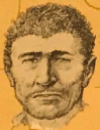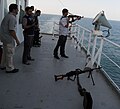Portal:Piracy
Introduction

Piracy is an act of robbery or criminal violence by ship or boat-borne attackers upon another ship or a coastal area, typically with the goal of stealing cargo and valuable goods, or taking hostages. Those who conduct acts of piracy are called pirates, and vessels used for piracy are called pirate ships. The earliest documented instances of piracy were in the 14th century BC, when the Sea Peoples, a group of ocean raiders, attacked the ships of the Aegean and Mediterranean civilisations. Narrow channels which funnel shipping into predictable routes have long created opportunities for piracy, as well as for privateering and commerce raiding.
Historic examples of such areas include the waters of Gibraltar, the Strait of Malacca, Madagascar, the Gulf of Aden, and the English Channel, whose geographic structures facilitated pirate attacks. The term piracy generally refers to maritime piracy, although the term has been generalized to refer to acts committed on land, in the air, on computer networks, and (in science fiction) outer space. Piracy usually excludes crimes committed by the perpetrator on their own vessel (e.g. theft), as well as privateering, which implies authorization by a state government.
Piracy or pirating is the name of a specific crime under customary international law and also the name of a number of crimes under the municipal law of a number of states. In the 21st century, seaborne piracy against transport vessels remains a significant issue, with estimated worldwide losses of US$25 billion in 2023, increased from US$16 billion in 2004. (Full article...)
Selected biography -
Micajah "Big" Harpe, born Joshua Harper (before 1768 – August 24, 1799), and Wiley "Little" Harpe, born William Harper (before 1770 – February 8, 1804), were American murderers, highwaymen and river pirates who operated in Tennessee, Kentucky, Illinois and Mississippi in the late 18th century. They are often considered the earliest documented serial killers in United States history.
Loyal to the British Crown during the American Revolution, the Harpes became outlaws after the war and began robbing and killing settlers in the remote frontier west of the Appalachian Mountains. They are believed to have killed 39 people, and possibly as many as 50. As the Harpes' crimes gained notoriety, vigilante groups formed to avenge their victims, and they were eventually tracked down and executed around the turn of the century. Their savagery has since entered American folklore, appearing to have been motivated more by blood lust than financial gain. (Full article...)
Selected article -

Operation Atalanta, formally European Union Naval Force (EU NAVFOR) Somalia, is an ongoing counter-piracy military operation at sea off the Horn of Africa and in the Western Indian Ocean, that is the first naval operation conducted by the European Union (EU), in support of United Nations resolutions 1814, 1816, 1838, and 1846 adopted in 2008 by the United Nations Security Council. Since 29 March 2019, the operational headquarters is located at Naval Station Rota (NAVSTA Rota) in Spain, having moved from London as a result of the British withdrawal from the EU.
It is part of a larger global action by the EU to prevent and combat acts of piracy in the Indian Ocean, and it is the first EU naval operation to be launched. It cooperates with the multinational Combined Task Force 151 of the US-led Combined Maritime Forces (CMF) and NATO's anti-piracy Operation Ocean Shield. (Full article...)
Did you know?
- ... that the developers of Hotline Miami 2: Wrong Number suggested that Australian customers pirate their game?
- ... that HMS Redpole, one of the aptly-named coffin brigs, sank in an action with a pirate vessel in August 1828?
- ... that Black Sheep Radio dedicated its first day of programming to a fallen pirate?
- ... that a search engine for pirated books has been used to train large language models?
- ... that North Korea thanked the United States for helping its sailors defeat a group of pirates?
- ... that Pixel Piracy's developers released a free torrent of their game?
- ... that, unlike traditional Western societies of the time, many pirate clans operated as limited democracies, demanding the right to elect and replace their leaders?
- ... that red Jolly Roger flags were the most feared of all; all prayed they never encountered the "Bloody Red," which boldly declared that no mercy would be shown and all victims would be killed?
- ... that in 2011, pirates were reported as raiding along the Danube River in the center of Europe?
Selected quotations
| “ | Now for our affair's are on the razor's edge, men of Ionia, wither we are to be free or slaves ... so if you will bear hardships now, you will suffer temporarily but be able to overcome your enemies | ” |
| — Dionysius the Phocaean | ||
General images
Selected Jolly Roger

Subcategories
Topics
WikiProjects
Related portals
Things you can do

Contribute
- Work on piracy and pirate articles and help improve them to featured articles.
Expand
Join
WikiProject Piracy Requests
- eliminate red links from List of pirates
- expand Timeline of piracy, specifically to fill in vast gap between the 1890s to 2000s
- revise Bartholomew Roberts
- help with Requested articles and Expand articles
- help with Portal:Piracy
Associated Wikimedia
The following Wikimedia Foundation sister projects provide more on this subject:
-
Commons
Free media repository -
Wikibooks
Free textbooks and manuals -
Wikidata
Free knowledge base -
Wikinews
Free-content news -
Wikiquote
Collection of quotations -
Wikisource
Free-content library -
Wikiversity
Free learning tools -
Wiktionary
Dictionary and thesaurus



































































































